Ethanol has less energy than petrol so if you are running it in an engine that is jetted to lean burn strait fuel then it will be running very lean ( hole in piston type lean ) however that is not a problem for engines designed to burn it
Ethanol burns slower than petrol so the timing needs to be advanced just a smidge on engines not designed to burn it .
Ethanol will adsorb moisture which is good & bad.
The good bit is it will scavenge water that has accumulated in fuel tank & run it through the engine ( where it increases power ) .
The bad bit is when it is water saturated any more water will cause it to drop out ( phase separation )
The water ethanol mix is acidic and will cause galvanic corrosion to zinc plated parts and to a far lesser extent to cast zinc like carbs
The ethanol / water mix will support the growth of bacteria , just the same as the bacteria that can grow in diesel tanks left standing for a long time .
And remember it is only 5% to 15 % so it is not very much ethanol in fuel .
Brazil runs e85 and has been doing so for decades
South Africa ran e95 during the BS embargo in engines designed to run strait petrol without the entire country coming to a grinding hault although they did ban the use of all 2 stroke engines at the time .
While ethanol is touted as a enviromental pollution solution in reality it is a political & financial idea done in order to reduce the amount of imported oil .
Like all of the solutions looking for problem ( seafoam , etc ) weather e?? will cause you grief is very much dependent upon a host of factors that will be unique to your location & engine use .
Naturally the oil industry does everything in its power to accentuate the minor problems that can occur with e?? use and the corn lobby does everything they can to push the benefits of using e??
Some where in the middle is the truth
Bioactive sludge in the bottom of your carb is
Things customers do:
Dump the fuel out if a 2 stroke but not start it and really run the fuel out.
Dump stabilizer in the gas tank and not run engine to get stabilized fuel uo to the carb.
Store equipment half full if gas.
Use premium for off season storage.
Mix motor oil with the fuel to stop rust.
Remove spark plug for safe storage. (Probably some internet BS).
Never ever drain all the fuel from a generator or tiller.
Dump fresh fuel on top of fuel years old fuel and the carb is trashed and tell you it ran last week.
Bring in a piece of equipment saying they think it needs a spark plug and you notice the float bowl is rusted off.
very much as problematic as varnish from strait fuel and a lot easier to clean out .
 Carburetor, clogged, BAD, Troy Bilt tiller.jpeg41.8 KB · Views: 8
Carburetor, clogged, BAD, Troy Bilt tiller.jpeg41.8 KB · Views: 8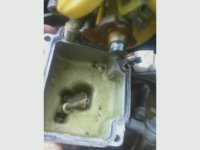 DR350, Mike's, clogged green carb.jpeg35.2 KB · Views: 8
DR350, Mike's, clogged green carb.jpeg35.2 KB · Views: 8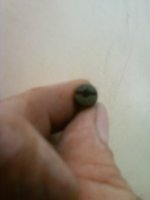 DR350, Mike's, clogged green main jet.jpeg302.1 KB · Views: 7
DR350, Mike's, clogged green main jet.jpeg302.1 KB · Views: 7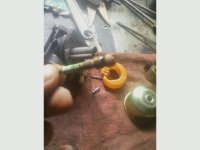 Carburetor, eBay, clogged.jpeg50 KB · Views: 7
Carburetor, eBay, clogged.jpeg50 KB · Views: 7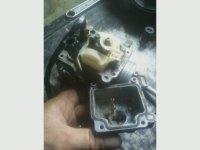 downsize.jpeg41.7 KB · Views: 6
downsize.jpeg41.7 KB · Views: 6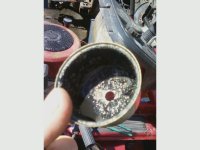 Float bowl, Murray tractor.jpeg59.6 KB · Views: 8
Float bowl, Murray tractor.jpeg59.6 KB · Views: 8